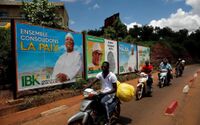Pan-Bahianism
Pan-Bahianism is a political movement which promotes the independence of the Bahian subcontinent and encourages solidarity amongst both Bahian nations and all Bahian peoples and people of Bahian descent across the world.
Pan-Bahianism is simultaneously regarded as a political, economic and cultural project, with the eventual goal of the creation of a singular Bahian community united upon the principles of common ancestry, common struggles and a common destiny inexorably linked to the complete emancipation of the entire subcontinent from foreign control. Originally, this took the form of colonialism, but in the modern era has been expanded to economic, cultural and political hegemony. As a political movement, the internal currents of Pan-Bahianism have historically been highly diverse and range from Socialism as advocated by Izibongo Ngonidzashe in Rwizikuru to Ngiilism in Kaiye Tourie and to various other ideological currents. These internal divisions have been one of the principal obstructions to Pan-Bahianism, rendering institutions such as the Congress of Bahian States all but useless.
Pan-Bahianism first emerged in political discourse at the start of the 20th century, as a part of the increased awareness of a national conscience within Euclean-colonised Bahia. While first mooted as a purely scholastic goal by authors such as Baptiste Muusu and INSERT DUDE HERE, the formation of the Pan-Bahian Democratic Party in COUNTRY in 1902 and the Conference for the Promotion of the Pan-Bahian Idea began to promote the ideology in a serious manner. With decolonisation, Pan-Bahianism played a key role in the ideological motivations of many key political groups in the newly-formed nations, with leaders such as Ardachire Touré being fervent proponents of the goal. The formation of the Congress of Bahian States was seen as an early step towards Bahian unity, though political divisions soon stopped progress. In the modern era, Pan-Bahianism remains a highly relevant political goal with influence in the political, economic and literary spheres of both Bahia and areas with large Bahian diasporic populations.
Origins of Pan-Bahianism
Colonisation of Bahia
End of Slavery in Asteria
The Revolt of the Métis
Political beginnings
Pan-Bahian Democratic Party
First Conference
Proclamation of 1902
Second Conference
Independence era
Congress of Bahian States
Militancies and Revolution
Political divisions
Modern Pan-Bahianism
In Bahia
In Kaiye Tourie

As a one-party state under the Rassemblement of the Pan-Bahian Centre, Pan-Bahianism forms a key part of Kaiye Tourie's political and economic strategy. Politically, this takes the form of active involvement within the Congress of Bahian States and support for Pan-Bahian projects in ideological statements. Political propaganda in Kaiye Tourie advocates for greater cooperation with other Bahian states, stressing the unity of the people of the nations. Within the Community of Nations, Kaiye Tourie advocates for non-interference within Bahian issues and local solutions.
Economically, Kaiye Tourie pursues active ties with other Bahian nations. It is the host of the Pan-Bahian Development Bank, which helps fund development projects within other Bahian nations. It is connected to its neighbours by rail services and has worked to further transport infrastructure between Bahian nations. This has included development on the Banga-Rwizi river to benefit agricultural projects in the nations which are touched by this river. The government funds hundreds of scholarships each year to Bahian students to study in universities in Kaiye Tourie.